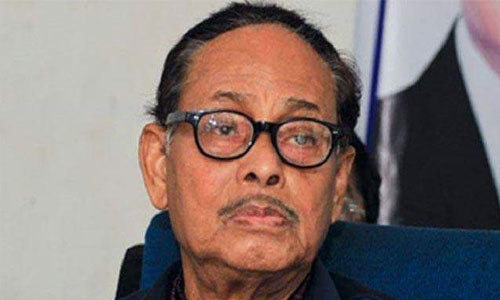Jatiya Party Chairman HM Ershad passes away

Jatiya Party Chairman Hussain Muhammad Ershad, who has been on life support for the last 10 days, passed away on Sunday morning (Inna lillahi wa inna ilaihi Rajiun). He was 89.
Ershad, also the leader of the opposition in parliament, breathed his last around 7:45am at the Combined Military Hospital (CMH) in the capital, said former Secretary General of JP Ziauddin Bablu.
The former military ruler had long been suffering from various old age complications, including low haemoglobin, liver problem and high bilirubin. He was admitted to the CMH on June 26 and was kept at the Intensive Care Unit (ICU).
Ershad frequently received treatment aboard and at the CMH here at different times over the last eight months.
He had captured power in 1982 when he was the army chief and declared himself the President the next year. He, later, formed the Jatiya Party and won the controversial election of 1986.
The military dictator was ousted through a mass uprising in the early '90s.
UNB adds: Fight for having brother as successor
Ershad's wife Raushon Ershad, who had been maintaining a distance with her husband since she was unhappy as he made GM Quader Jatiya Party successor and donated most of his assets and property to a trust, had reportedly established her control over the party before the 10th parliamentary election in 2013 taking a stance against Ershad's decision of boycotting the national election, and subsequently she played the role of Leader of the Opposition in Parliament last time.
But Ershad regained his control over the party before the December-30 general election and became the Leader of the Opposition in the current parliament.
Ershad had also picked his brother to run the party in his absence on January 1 last and appointed Quader as the deputy leader of opposition three days later.
In a similar bid on January 18, 2016, the Jatiya Party chairman tried to install Quader as his successor by making him as party cochairman which is foiled by the leaders close to Raushon.
Amid strong resentment in the party, Ershad also removed Quader from the post of the deputy opposition leader on March 23, nominating his wife Raushon for the post.
The maverick former military leader, known for frequently changing his decisions, Ershad reinstated his younger brother GM Quader as party chairman in his absence on April 6.
A day after nominating Quader his party successor, the Jatiya Party chief donated his all assets and wealth to a trust, fuelling the family feud further.
Rise and Fall
Born on February 1, 1930 in the Koochbihar district of West Bengal, Ershad was commissioned in the Pakistan Army in 1952.
After his repatriation from Pakistan to Independent Bangladesh, Ershad was appointed Adjutant General of Bangladesh Army in 1973.
Ershad was promoted to the post of the Chief of Army Staff in December 1978 during the rule of Ziaur Rahman.
Amid political turmoil after the assassination of Zia by an army cabal, he took over the state power from then President Abdus Sattar on March 24, 1982, promulgating the martial law.
Ershad also declared himself as commander-in-chief of the armed forces, a constitutional post held by the elected President.
He made a very important change in the local government system by introducing the upazila system in the country in 1984.
Ershad formed 'Jatiya Party' in 1986 and was elected President for a term of five years the same year through the third parliamentary election, triggering huge protest by other political parties.
In the face of a strong opposition movement, Ershad dissolved the parliament on December 7, 1987. The 4th parliamentary election was held on March 3, 1988 was boycotted by all major opposition political parties.
Amid a fierce combined movement by the opposition parties, he was finally forced to step down on 6 December 1990.
The Jatiya Party chief was later accused of corruption as well as other offences, and kept confined to prison.
The deposed political leader contested the parliamentary elections from prison twice in the span of six years, and won on both occasions from five seats.
After six years of confinement, Ershad was granted bail, and was released from prison on January 9, 1997.He, however, lost his membership of the Jatiya Sangsad due to conviction by the court.
Ershad was once again arrested in 2001, in a trial called the 'Janata Tower Case', on charges of using political authority to assign land, and having black money. Even though he was sentenced to seven years of imprisonment, the military ruler only served four months, after which he got out on bail.
He was given 'Palli Bandhu' (Friend of Villages) title by his followers for his role in developing rural areas during his rule.
On May 15, 2011, the Supreme Court of Bangladesh announced that the martial law introduced by this military leader was illegal.
